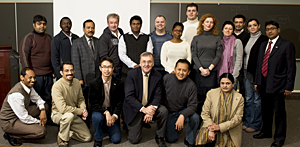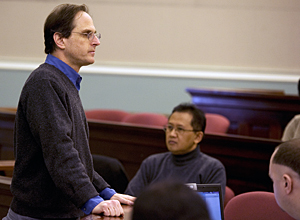

ADVERTISEMENT
- Rozovsky wins prestigious NSF Early Career Award
- UD students meet alumni, experience 'closing bell' at NYSE
- Newark Police seek assistance in identifying suspects in robbery
- Rivlin says bipartisan budget action, stronger budget rules key to reversing debt
- Stink bugs shouldn't pose problem until late summer
- Gao to honor Placido Domingo in Washington performance
- Adopt-A-Highway project keeps Lewes road clean
- WVUD's Radiothon fundraiser runs April 1-10
- W.D. Snodgrass Symposium to honor Pulitzer winner
- New guide helps cancer patients manage symptoms
- UD in the News, March 25, 2011
- For the Record, March 25, 2011
- Public opinion expert discusses world views of U.S. in Global Agenda series
- Congressional delegation, dean laud Center for Community Research and Service program
- Center for Political Communication sets symposium on politics, entertainment
- Students work to raise funds, awareness of domestic violence
- Equestrian team wins regional championship in Western riding
- Markell, Harker stress importance of agriculture to Delaware's economy
- Carol A. Ammon MBA Case Competition winners announced
- Prof presents blood-clotting studies at Gordon Research Conference
- Sexual Assault Awareness Month events, programs announced
- Stay connected with Sea Grant, CEOE e-newsletter
- A message to UD regarding the tragedy in Japan
- More News >>
- March 31-May 14: REP stages Neil Simon's 'The Good Doctor'
- April 2: Newark plans annual 'wine and dine'
- April 5: Expert perspective on U.S. health care
- April 5: Comedian Ace Guillen to visit Scrounge
- April 6, May 4: School of Nursing sponsors research lecture series
- April 6-May 4: Confucius Institute presents Chinese Film Series on Wednesdays
- April 6: IPCC's Pachauri to discuss sustainable development in DENIN Dialogue Series
- April 7: 'WVUDstock' radiothon concert announced
- April 8: English Language Institute presents 'Arts in Translation'
- April 9: Green and Healthy Living Expo planned at The Bob
- April 9: Center for Political Communication to host Onion editor
- April 10: Alumni Easter Egg-stravaganza planned
- April 11: CDS session to focus on visual assistive technologies
- April 12: T.J. Stiles to speak at UDLA annual dinner
- April 15, 16: Annual UD push lawnmower tune-up scheduled
- April 15, 16: Master Players series presents iMusic 4, China Magpie
- April 15, 16: Delaware Symphony, UD chorus to perform Mahler work
- April 18: Former NFL Coach Bill Cowher featured in UD Speaks
- April 21-24: Sesame Street Live brings Elmo and friends to The Bob
- April 30: Save the date for Ag Day 2011 at UD
- April 30: Symposium to consider 'Frontiers at the Chemistry-Biology Interface'
- April 30-May 1: Relay for Life set at Delaware Field House
- May 4: Delaware Membrane Protein Symposium announced
- May 5: Northwestern University's Leon Keer to deliver Kerr lecture
- May 7: Women's volleyball team to host second annual Spring Fling
- Through May 3: SPPA announces speakers for 10th annual lecture series
- Through May 4: Global Agenda sees U.S. through others' eyes; World Bank president to speak
- Through May 4: 'Research on Race, Ethnicity, Culture' topic of series
- Through May 9: Black American Studies announces lecture series
- Through May 11: 'Challenges in Jewish Culture' lecture series announced
- Through May 11: Area Studies research featured in speaker series
- Through June 5: 'Andy Warhol: Behind the Camera' on view in Old College Gallery
- Through July 15: 'Bodyscapes' on view at Mechanical Hall Gallery
- More What's Happening >>
- UD calendar >>
- Middle States evaluation team on campus April 5
- Phipps named HR Liaison of the Quarter
- Senior wins iPad for participating in assessment study
- April 19: Procurement Services schedules information sessions
- UD Bookstore announces spring break hours
- HealthyU Wellness Program encourages employees to 'Step into Spring'
- April 8-29: Faculty roundtable series considers student engagement
- GRE is changing; learn more at April 15 info session
- April 30: UD Evening with Blue Rocks set for employees
- Morris Library to be open 24/7 during final exams
- More Campus FYI >>
1:52 p.m., Jan. 25, 2011----Jacinth Byles, one of 18 participants in the National Security Institute now under way at the University of Delaware, is looking for new techniques, tools and best practices to respond to a major threat in her country.
“In Jamaica, we are plagued with a high incidence of crime, which has now become our number-one problem,” says Byles, who is the executive director of the National Security Policy Coordination Unit in Jamaica's Office of the Cabinet.
“Faced with the challenges of globalization and given an opportunity to understand how the U.S. and other countries manage new and similar threats can only serve to be beneficial,” she notes. “I hope to hear from other participants, strategies their countries have employed that could be of value in my country.”
Led by Mark J. Miller, Emma Smith Morris Professor of Political Science and International Relations at UD, the institute, known formally as the Study of the United States Institute on U. S. National Security Policy Making in a Post-9/11 World, is designed to build a community of policy makers and scholars with a deeper understanding of American foreign policy and national security policy. UD has hosted the institute periodically since 2003, with support from the U.S. Department of State.
“The institute offers the opportunity to develop an epistemic community -- a knowledge-based community -- among and between the scholars and their American counterparts lasting beyond the scholars' stay in the United States,” Miller says.
This year's participants were chosen through a careful selection process that considered geographic, gender and career diversity, according to Kevin Orchison, program officer for the Study of the U.S. Branch of the U.S. Department of State's Bureau of Educational and Cultural Affairs.
The participants include university professors, military officers, government officials and diplomats from Argentina, Bangladesh, Croatia, Czech Republic, India, Indonesia, Jamaica, Kenya, Mexico, Mongolia, Nepal, New Zealand, Pakistan, Russia, Sri Lanka, Sudan, Turkmenistan and Ukraine.
“We're very happy with the program and the faculty here at the University of Delaware,” Orchison notes. “There's great institutional support, and the faculty are very creative in exploring this topic through a very nuanced presentation, so that when the participants return home, they have a very illuminating perspective on, not just the U.S., but Nepal, India, Kenya, and so on.”
In addition to engaging in lectures, workshops and site visits to locales ranging from Boston to Washington, D.C., and from the Naval War College in Newport, R.I., to West Point, each participant also undertakes a follow-up research project, culminating in a book chapter.
“This is very important work we are performing for the United States,” Miller says. “We are very grateful and proud to do so, with the support of the U.S. State Department, the UD administration, the Institute for Global Studies, the dean of arts and sciences, and our faculty in the Department of Political Science and International Relations.”
Article by Tracey Bryant


